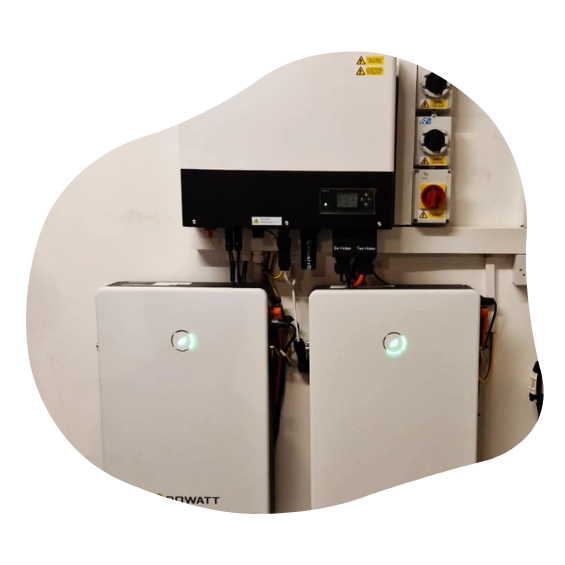
Modern Renewables – Solar Batteries
I Have Solar Panels, Should I Install a Battery Storage System?
If you already have solar panels installed, you’re likely enjoying the benefits of lower energy bills and reduced carbon footprint. But what about further optimizing your solar energy system with a battery storage system? As more homeowners seek to maximize their energy independence and savings, battery storage systems are becoming increasingly popular. Here’s what you need to know to decide if adding a battery storage system to your solar setup is a wise move.
Benefits of Installing a Battery Storage System
- Maximizing Solar Energy Use:
- Increased Self-Consumption: Without a battery, any surplus energy generated by your solar panels during the day is sent back to the grid. With a battery storage system, you can store this excess energy for later use, such as during the evening or cloudy days, thus maximizing your use of the solar energy you generate.
- Energy Independence: By storing solar energy, you reduce your reliance on the grid and can use your own renewable energy even when the sun isn’t shining.
- Cost Savings:
- Reduced Energy Bills: Utilizing stored energy during peak hours can help you avoid high electricity rates, further lowering your energy costs.
- Smart Export Guarantee (SEG): While exporting surplus energy to the grid can earn you some income through schemes like the SEG, using that energy yourself is often more cost-effective, as the cost of energy from the grid is usually higher than the export rate.
- Backup Power Supply:
- Energy Security: A battery storage system can provide a backup power source during power outages, ensuring that critical appliances and systems continue to operate.
- Environmental Impact:
- Enhanced Sustainability: By maximizing your use of solar energy and minimizing grid dependency, you further reduce your carbon footprint, contributing more significantly to environmental sustainability.
Challenges and Considerations
- Initial Investment:
- High Upfront Costs: Battery storage systems can be expensive, with costs varying depending on the capacity and brand. This initial investment can be a barrier for some homeowners, though prices are gradually decreasing as technology advances and demand increases.
- Lifespan and Degradation:
- Battery Lifespan: Batteries have a finite lifespan, typically ranging from 5 to 15 years. Over time, their storage capacity can degrade, reducing efficiency and necessitating eventual replacement.
- Space and Installation:
- Physical Space: Battery systems require installation space, usually in a garage or utility room. Ensuring you have the appropriate space and conditions for installation is essential.
- Installation Costs: Professional installation adds to the overall cost. It’s important to factor in these additional expenses when considering a battery storage system.
- Financial Incentives and Payback Period:
- Incentives: While there are various incentives for solar panel installation, fewer exist specifically for battery storage systems. It’s crucial to research and understand the available financial incentives and grants in your area.
- Payback Period: Calculate the payback period by considering your current energy consumption, savings from reduced grid dependency, and the cost of the battery system. This will help you determine how long it will take to recoup your investment.
Is It Worth Adding a Battery Storage System?
Determining whether to install a battery storage system depends on several factors:
- Energy Usage Patterns: If you use most of your electricity during the day when your solar panels are generating power, you may benefit less from a battery. Conversely, if you consume more energy in the evening, a battery can significantly reduce your reliance on the grid.
- Electricity Rates and Incentives: Evaluate your electricity rates, the difference between peak and off-peak rates, and any available incentives for energy storage. This financial analysis will help you understand the potential savings.
- Future Energy Goals: Consider your long-term energy goals. If you aim for maximum energy independence, reducing your carbon footprint, or preparing for future energy price hikes, a battery storage system can be a strategic investment.
Final Thoughts
Adding a battery storage system to your existing solar panel setup can provide substantial benefits, from maximizing your solar energy use and achieving greater energy independence to enhancing your home’s resilience and sustainability. However, the decision should be based on a thorough evaluation of your energy usage patterns, financial considerations, and long-term goals.
By carefully weighing the benefits against the challenges, you can determine if a battery storage system is the right addition to your solar energy setup. For many homeowners, the long-term savings and increased energy security make it a worthwhile investment, paving the way for a more sustainable and self-sufficient future.
